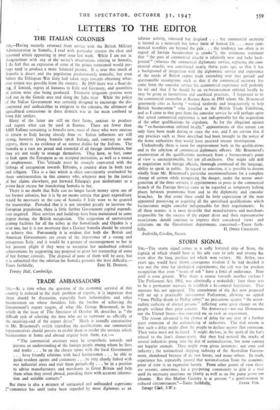LETTERS TO THE EDITOR
THE ITALIAN COLONIES
Sta,—Having recently returned from service with the British Military Administration in Somalia, I -read with particular interest the clear and reasoned article appearing in your issue last week. While I am not in disagreement with any of the writer's observations relating to Somalia, I do feel that an expansion of some of the points mentioned would per- haps tend to produce a more balanced picture. It is true that much of Somalia is desert -and the population predominantly nomadic, but even before the Ethiopian War Italy had taken steps towards obtaining what- ever return was possible from the country. By 1939 there was a flourish- ing, if limited, export of bananas to Italy and Germany, and quantities of cotton were also being produced. Extensive irrigation systems were laid out in the Genale area and along the Juba river. While the policy of the Italian Government was certainly designed to encourage the dis- contented and undesirables to emigrate to the colonies, the allotment of agricultural concessions in these districts was in the main confined to bona fide settlers.
Many of the latter are still on their farms, anxious to produce and export what can be used in Europe. There are fewer than 4,000 Italians remaining in Somalia now, most of those who were anxious to return to Italy having already done so. Italian influences are still strong, however (many Somalis speak Italian), and, contrary to some reports, there is no evidence of an intense dislike for the Italians. The Somalis as a race are proud and resentful of all foreign interference, but they are not ready to manage themselves. They have, in fact, come to look upon the European as .an accepted institution, as well as a source of employment. This 'attitude must be strongly contrasted with the feelings of antagonism towards Ethiopia, a country alien in both race. and religion. This is a fact which is often conveniently overlooked by those sentimentalists in this country who, whatever may be the justice of her claims elsewhere, put forward Ethiopia's past misfortunes as a prima facie excuse for transferring Somalia to her.
There is no doubt that Italy can no longer lavish money upon any of her former colonies, but it is by no means certain that great expenditure wOuld be necessary in the case of &Omaha if Italy were to be granted the trusteeship. Provided that it is not intended greatly to increase the European population, there is little further Government capital expendi- ture required. Most services and buildings have been maintained to some degree during the British occupation. The suggestion of unrestricted grazing facilities for all the tribes in the Somalilands and Ogaden is a wise one, but it is not necessary that a Greater Somalia should be created to achieve this. Fortunately it is evident that both the British and American Governments are aware of the importance of a strong and prosperous Italy, and it would be a gesture of encouragement to her in her present plight if they were to recognise her undoubted colonial achievements by supporting any proposal to grant her trusteeship of some of her former colonies. The disposal of none of them will be easy, but it is submitted that the solution for Somalia presents the least difficulty.—
Trinity Hall, Cambridge.


































 Previous page
Previous page